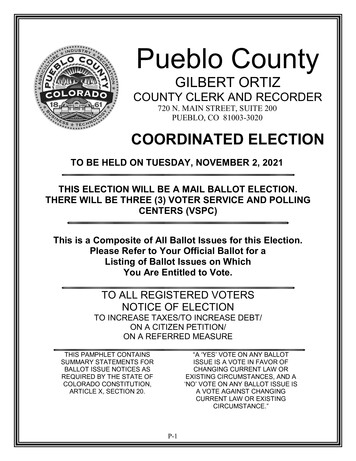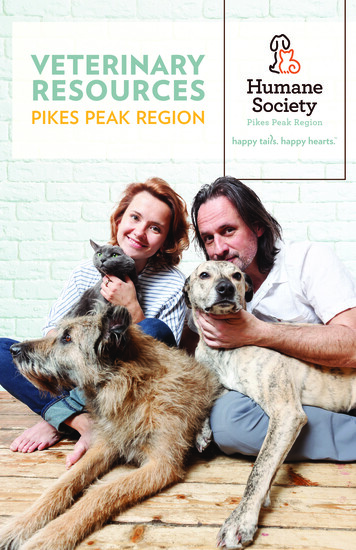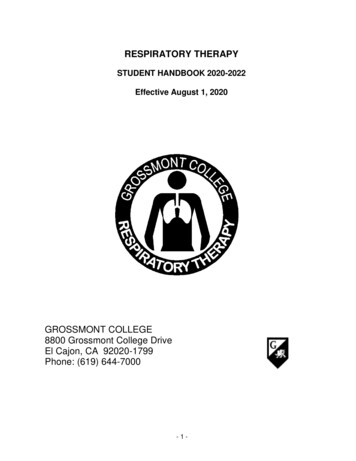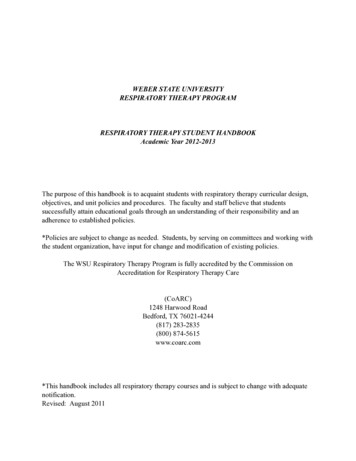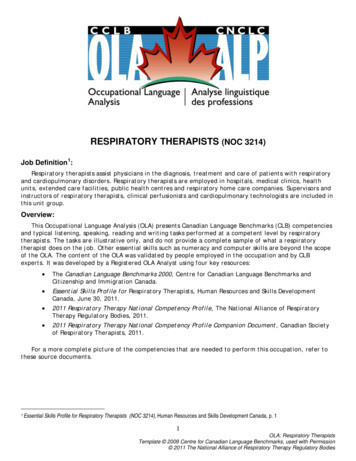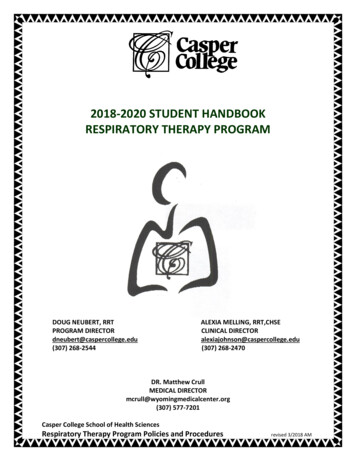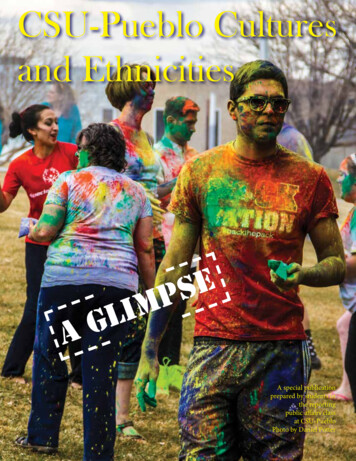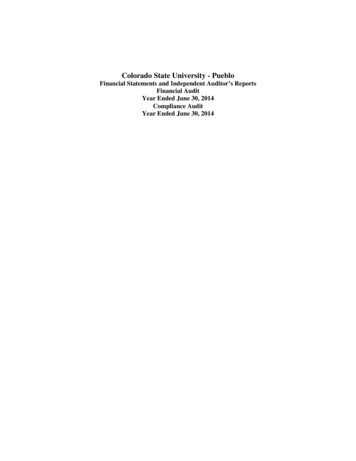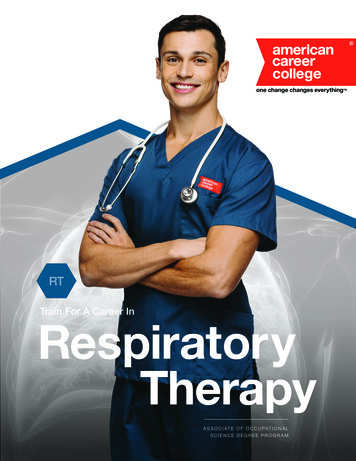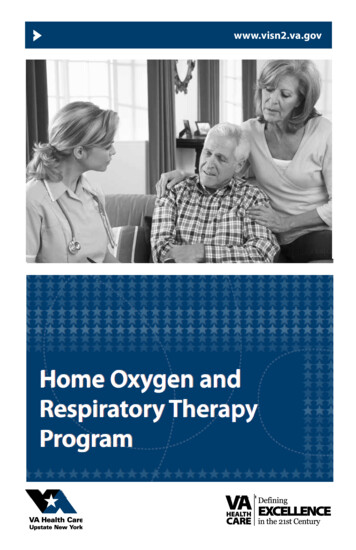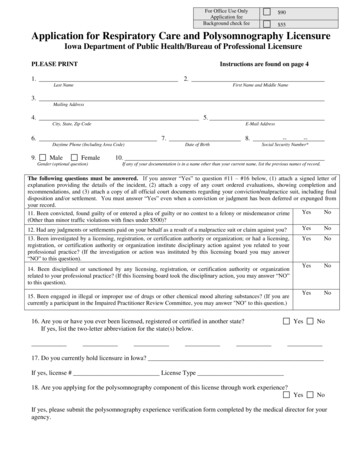
Transcription
1RESPIRATORY THERAPY PROGRAMPUEBLO CAMPUSSTUDENT HANDBOOK2020-2021
2Please note that this handbook and agreements within are subject to change and revision during thecourse of instruction.This Student Handbook (Handbook) contains pertinent information affecting students, currentthrough the date of its issuance. To the extent that any provision of this Handbook is inconsistentwith State or Federal law, State Board for Community Colleges and Occupational Education Policies(BPs) or Colorado Community College System President’s Procedures (SP’s), the law, BPs and SPs shallsupersede and control. BPs and SPs are subject to change throughout the year and are effectiveimmediately upon adoption by the Board or System President, respectively. Students are expected tobe familiar with and adhere to the BPs, SPs as well as College directives, including but not limited tothe contents of this Handbook.Click to access BPs and SPs,Nothing in this Handbook is intended to create (nor shall be construed as creating) an express orimplied contract or to guarantee for any term or to promise that any specific process, procedures orpractice will be followed or benefit provided by the College. The College reserves the right tomodify, change, delete or add to the information in this Handbook as it deems appropriate.Revised 7/19
3Respiratory Care Program Approval and AccreditationRespiratory Care ProgramThe Pueblo Community College Respiratory Care Program is accredited by the Commission onAccreditation for Respiratory Care (CoARC), 12248 Harwood Road, Bedford,TX 76021-4244;Telephone: 817.283.2835.Higher Learning Commission AccreditationPueblo Community College is accredited by The Higher Learning Commission and is a member of theNorth Central Association (www.ncacihe.org, 312-263-0456), 30 North LaSalle Street, Suite 2400,Chicago, IL 60602. In addition, several programs hold approval or accreditation from national and statelevel associations and agencies.Gainful Employment InformationThe US Department of Education requires disclosure of information for any financial aid eligibleprogram that “prepares students for gainful employment in a recognized occupation." Go towww.pueblocc.edu/Academics/DegreesCertificates/ for additional program & employment outlookinformation.Statement of Non-DiscriminationPueblo Community College is an equal opportunity educational institution and does not discriminateon the basis of age, race, religion, color, national origin, sex, or disability in its activities, programs, oremployment practices as required by Title VI, Title IX, Section 504, Age Discrimination Act, and Title IIof the ADA. The College has designated the Director of Human Resources as its Affirmative ActionOfficer with the responsibility to coordinate its civil rights compliance activities and grievanceprocedures. For information, contact the Director of Human Resources, 900 W. Orman Avenue,telephone and TDD (719) 549-3220; or the Office for Civil Rights, U.S. Department of Education, RegionVIII, Federal Office Building, 1244 North Speer Boulevard, Suite 310, Denver, CO 80204, telephone(303) 844-3417.ADA NoticeReasonable accommodations will be provided upon request for persons with disabilities. To make arequest, please notify the PCC Disability Resources Team at 719-549-3449 orDisability.Resources@pueblocc.edu at least four working days before the event.
4ContentsRESPIRATORY THERAPY PROGRAM . 1STUDENT HANDBOOK . 1Respiratory Care Program Approval and Accreditation . 3Respiratory Care Program. 3Higher Learning Commission Accreditation . 3Gainful Employment Information . 3Statement of Non-Discrimination . 3ADA Notice . 3WELCOME STUDENTS, . 6ABOUT THE COLLEGE . 7MISSION STATEMENT DEPARTMENT OF RESPIRATORY THERAPY . 7RESPIRATROY THERAPY PROGRAM PHILOSOPHY . 7RESPIRATORY THERAPY PROGRAM EDUCATIONAL PHILOSOPHY . 8AARC Statement of Ethics and Professional Conduct . 9AARC Definition of Respiratory Care . 10PROGRAM Student Learning Outcomes . 11Definitions of Major Concepts Used in the Program Student LearningOutcomes and Competencies . 11GENERAL INFORMATION FOR STUDENTS . 15Student Success . 15Essential Functions (Appendix A) . 15Background Checks/Drug Screens . 16Basic Life Support and Immunizations . 16Safety and Emergency Procedure: . 16ATTENDANCE/TARDINESS POLICIES . 17Electronic communication device USE POLICIES . 18AMERICAN NURSES ASSOCIATION (ANA) TIPS FOR USING SOCIAL MEDIA . 19ANA’s Principles for Social Networking Adopted into PCC RespiratoryTherapy Program Policies: . 19FAILURE/CONTINUATION/READMISSION POLICIES . 21Readmission Policy. 22TRANSFERRING POLICY . 23SKILL OR COPENTENCY CHECK-OFFS: . 23ACADEMIC/CLINICAL ISSUES/BEHAVIORAL ISSUES . 24PCC Code of Conduct . 24Course Issues. 24Academic Dishonesty . 24POLICIES FOR BEHAVIORAL MISCONDUCT IN CLASSROOM/LABS . 25POLICIES FOR BEHAVIORAL MISCONDUCT IN CLINICAL SETTINGS. 25PROTOCOL FOLLOWING BEHAVIORAL MISCONDUCT . 26Warning/Probation: . 26Clinical/Simulation/Lab Dismissal: . 27Clinical/Simulation Failure: . 27
5Information on the Clinical Preceptor Curriculum . 27Dismissal from the Clinical Agency . 29Clinical Incidents . 29Protocol Following Clinical Failure . 29TESTING GUIDELINES . 30What to Bring to the Testing Center.Error! Bookmark not defined.Break 30Keeping Exams Secure. 30Exam Misconduct . 31INJURY AND ACCIDENTAL EXPOSURE . 32APPEARANCE AND DRESS CODE . 32PROFESSIONAL GUIDELINES . 34PROFESSIONAL BEHAVIOR/WORK ETHIC. 34PROFESSIONAL PRESENTATION OF SELF . 35PERSONAL COMMITMENT TO THE DISCIPLINE PROFESSSIONAL VALUES. 37DRUGS/ALCOHOL/TOBACCO . 39Letter of Agreement . 40APPENDIX A: Essential Functions . 41Program Requirements: . 42Gross Motor Skills . 42Fine Motor Skills. 42Physical Endurance . 42Physical Strength. 42Mobility . 43Hearing . 43Visual 43Tactile 43Arithmetic Competence . 44Emotional Stability . 44Critical Thinking. 44Interpersonal Skills . 45Communication Skills . 45APPENDIX B: Title IX . 46Title IX and Pregnancy Fact Sheet for Instructors – Colorado CommunityCollege System . 46APPENDIX D: Clinical Retention Algorithm . 47APPENDIX E: PCC Respiratory Therapy Lab Guidelines . 48Skills Lab Simulation Learning Lab Dress Code . 48Personal Belongings . 48Supplies, Equipment and Resources . 48Needle Sticks and Other Incidences: . 49Video taping . 49Housekeeping . 49Other Lab Services . 50Required Documents for Student Files: . 50
6WELCOME STUDENTS,To the Respiratory Therapy Program:As the faculty and staff of the Respiratory Therapy Department at Pueblo Community College,we would like to extend a warm welcome to each and every one of you. Respiratory Therapy schoolis a journey of strength, endurance, experiences and growth. We know that each and every one ofyou is prepared, both mentally and physically, for the challenge that lies ahead.The faculty is here to guide you in your journey as a student. We encourage you to askquestions, do independent research, and talk with your instructors. We have one common goal, tosee each of you complete the rigorous curriculum of the Associate Degree Program in RespiratoryTherapy at Pueblo Community College.To prepare for this demanding and rewarding profession you will be expected to:1. Attend all classes and clinical/simulation activities as scheduled. (See attendance and tardinesspolicies).2. Display an inquiring attitude and a willingness to explore new or different concepts and ideas.3. Comply with Pueblo Community College policies and those specific to the department ofrespiratory therapy as stated in this handbook.4. Complete all course requirements [clinical/simulation requirements] and written assignmentson time and at a minimum academic level of "C" (77%).5. Accept personal responsibility for requesting extra help and tutorial assistance early in thecourse if needed.6. Establish personal priorities that are realistic and a time management action plan for meetingcurriculum requirements.7. Use the problem-solving process to resolve issues and complaints; accept and profit fromconstructive criticism.8. Demonstrate behaviors indicative of personal and professional integrity.9. Inform your instructor in a timely manner of any condition which would interfere with or impairyour ability to care for an assigned patient.10. Follow the chain of command if issues arise. The chain of command is as follows:1. Instructor (clinical or course)2. Program Director3. Dean of Health and Public Safety4. College President
7ABOUT THE COLLEGEPueblo Community College is an educational institution, whose mission is to provide qualityeducational opportunities that transform the lives of our students, enrich our communities, andstrengthen the regional economy. In this context, academic programs and support services aredesigned to provide career skills and knowledge to meet learning and employment needs of a diverse,multicultural population. The rapid expansion of knowledge and the technological developmentcharacterizing the work place demands continuing and expanding skills and intellectual abilities byemployees. As a result of these changes, adult workers are returning to school to update theirknowledge and/or to prepare for new and different careers. College administrators, faculty and staffare committed to providing a wide variety of creative, up-to-date educational programs that willprovide reentering adults and new high school graduate students with the knowledge andcompetencies to find meaningful employment. As a productive member of the communities (i.e.Pueblo, Fremont, Durango and Mancos), the college accepts the responsibility to design programs thatwill meet manpower needs of a variety of industries in our service areas. To meet the needs ofemployers and of students desiring health care careers, several respiratory care programs are offeredby the college.Advances in research and practice are revolutionizing the American health-care system. To maintaincompetency, health-care workers must secure advanced knowledge and develop complex skills tomeet the practice needs in this highly demanding profession.The faculty at Pueblo Community College acknowledges and endorses their institutions' mission andphilosophy. Faculty are committed to providing high-quality, relevant educational experiences to meetthe demands of a technological and global economy congruent with the overall college purpose. Thefaculty recognizes and accepts professional standards that give substance and direction to therespiratory therapy program and are foundational components of the curriculum.MISSION STATEMENT DEPARTMENT OF RESPIRATORY THERAPYTo provide excellent education that prepares the learner to become a member of the respiratorytherapy profession and community while meeting the needs of diverse patient populations.RESPIRATROY THERAPY PROGRAM PHILOSOPHYThe faculty believe that respiratory therapy is the protection, promotion, and optimization of healthand abilities; prevention of illness and injury; alleviation of suffering through the diagnosis andtreatment of human response; and advocacy in the care of individuals, families, communities andpopulations. To practice effectively, the respiratory therapist must use educated judgment andintegrate evidence into practice by critical thinking and clinical reasoning. These skills are alsoessential when interfacing with the clinical microsystem and the larger healthcare environment todeliver quality, safe, patient-centered care. An understanding of the healthcare organization allowsthe therapist to exhibit leadership, practice according to ethical, legal and professional/regulatorystandards and improve the quality of care for patients, families and communities.
8The Respiratory Therapy Program at Pueblo Community College embraces the definition ofRespiratory Care as outlined in the American Association of Respiratory Care’s Position Statement,which states: nts/position-statements/Definition of Respiratory Care Respiratory Care is the health care discipline that specializes in thepromotion of optimum cardiopulmonary function and health and wellness. Respiratory Therapistsemploy scientific principles to identify, treat and prevent acute or chronic dysfunction of thecardiopulmonary system.Knowledge and understanding of the scientific principles underlying cardiopulmonary physiologyand pathophysiology, as well as biomedical engineering and application of technology, enablesrespiratory therapists to provide patient care services efficiently. As a health care profession,Respiratory Care is practiced under medical direction across the health care continuum. Criticalthinking, patient/ environment assessment skills, and evidence-based clinical practice guidelinesenable respiratory therapists to develop and implement effective care plans, patient-drivenprotocols, disease-based clinical pathways, and disease management programs. A variety ofsettings serves as the practice sites for this health care profession including, but not limited to;Acute care hospitals Sleep disorder centers and diagnostic laboratories Long term acute carefacilities Rehabilitation, research and skilled nursing facilities Patients’ homes Patienttransport systems Physician offices and clinics Convalescent and retirement centers Educational institutions Medical equipment companies and suppliers Wellness centersRESPIRATORY THERAPY PROGRAM EDUCATIONAL PHILOSOPHYThe educational process is seen as a cooperative effort requiring extensive interaction betweenstudents and faculty. Educational experiences are selected and developed by the faculty and arelocated in both the academic and the practice setting, appropriately enhanced by technology whereuseful. Learning activities include instruction and practice in the application of knowledge and effectiveperformance of respiratory care skills and patient care. Curriculum content is designed to proceed fromthe simple to the complex and progresses from the known to new material. In addition to acquisitionof factual knowledge, course content is designed to promote critical thinking, clinical reasoning andrespiratory care judgment along with the incorporation of a caring attitude within an ethical valuesystemIntegrating professional standards, guidelines, and competencies is the basis for the respiratorytherapy curriculum. The program curriculum reflects current respiratory therapy based on currentpractices and healthcare initiatives. The curriculum provides an evidence-based foundation to meettoday’s healthcare needs. This is a requirement evidenced in both the Colorado Respiratory TherapyPractice Act and the expectations of the Commission of Accreditation for Respiratory Care (CoARC).The following resources were used in the development of the respiratory therapy curriculum andare continued resources for instruction: CoARC National Board of Respiratory Care (NBRC) American Association of Respiratory Care (AARC)
9Program student learning outcomes along with their related competencies reflect the expectedknowledge, skills, and attitudes of the graduates of Pueblo Community College’s Associate Degreeprograms preparing graduates as registered respiratory therapists. The associate degree respiratorytherapist acknowledges the uniqueness of each individual and practices in accordance with a personalvalue system and the standards of the Respiratory Therapy Practice Act.In keeping with sound curriculum design principles, the program student learning outcomes areused to organize the course student learning outcomes. These student learning outcomes will bethe basis for all activities related to the teaching/learning process, including delivery of instructionand evaluation of student progress.AARC Statement of Ethics and Professional ConductIn the conduct of professional activities the Respiratory Therapist shall be bound by the followingethical and professional principles. Respiratory Therapists shall:Demonstrate behavior that reflects integrity, supports objectivity, and fosters trust in theprofession and its professionals.Promote and practice evidence-based medicine.Seek continuing education opportunities to improve and maintain their professional competenceand document their participation accurately.Perform only those procedures or functions in which they are individually competent and whichare within their scope of accepted and responsible practice.Respect and protect the legal and personal rights of patients, including the right to privacy,informed consent, and refusal of treatment.Divulge no protected information regarding any patient or family unless disclosure is required forthe responsible performance of duty as authorized by the patient and/or family, or required bylaw.Provide care without discrimination on any basis, with respect for the rights and dignity of allindividuals.Promote disease prevention and wellness.Refuse to participate in illegal or unethical acts.Refuse to conceal, and will report, the illegal, unethical, fraudulent, or incompetent acts of others.Follow sound scientific procedures and ethical principles in research.Comply with state or federal laws which govern and relate to their practice.Avoid any form of conduct that is fraudulent or creates a conflict of interest, and shall follow theprinciples of ethical business behavior.Promote health care delivery through improvement of the access, efficacy, and cost of patientcare.Encourage and promote appropriate stewardship of resources.Work to achieve and maintain respectful, functional, beneficial relationships and communicationwith all health professionals.It is the position of the American Association of Respiratory Care that there is no place in aprofessional practice environment for lateral violence and bullying among respiratory therapists orbetween healthcare professionals.
10AARC Definition of Respiratory CareRespiratory Care is the health care discipline that specializes in the promotion of optimumcardiopulmonary function and health and wellness. Respiratory Therapists employ scientificprinciples to identify, treat and prevent acute or chronic dysfunction of the cardiopulmonarysystem. Knowledge and understanding of the scientific principles underlying cardiopulmonaryphysiology and pathophysiology, as well as biomedical engineering and application of technology,enables respiratory therapists to provide patient care services efficiently. As a health careprofession, Respiratory Care is practiced under medical direction across the health carecontinuum. Critical thinking, patient/environment assessment skills, and evidence-based clinicalpractice guidelines enable respiratory therapists to develop and implement effective care plans,patient-driven protocols, disease-based clinical pathways, and disease management programs.A variety of settings serves as the practice sites for this health care profession including, but notlimited to: Acute care hospitals Sleep disorder centers and diagnostic laboratories Long term acute care facilities Rehabilitation, research and skilled respiratory care facilities Patients’ homes Patient transport systems Physician offices and clinics Convalescent and retirement centers Educational institutions Medical equipment companies and suppliers Wellness centersRevised 7/19
11PROGRAM Student Learning OutcomesUpon successful completion of the Associate of Applied Science in Respiratory Therapy Degree, thegraduate will: Provide safe, quality, patient-centered respiratory care program care in a variety of healthcaresettings considering basic research, evidence, and patient preferences as the basis for care.(respiratory care program process, safety and patient-centered care)Engage in critical thinking and clinical judgment to make patient-centered care decisions.(critical thinking, clinical decision making and respiratory care program judgment)Participate in performance improvement/quality improvement activities to improve patientcare. (quality improvement and safety)Collaborate with healthcare team members to facilitate effective patient care. (teamwork andcollaboration)Use information technology to support and communicate the planning and provision of patientcare. (informatics)Manage care in a variety of healthcare settings for diverse patient populations through theprocess of planning, organizing, and directing. (leadership, advocacy)Function within the scope of practice of the Respiratory Therapy Practice Act incorporatingprofessional, legal, and ethical guidelines. (professionalism, ethical behavior, legal principles,standards of practice)Promote a culture of caring to provide support, compassion and culturally-competent, holisticcare. (caring, holistic care, cultural competency)Definitions of Major Concepts Used in the Program Student Learning Outcomesand CompetenciesCaring: The values, attitudes, and behaviors that engender feeling cared for. Promoting health,healing, and hope in response to the human condition.Clinical judgment: A process of observing, interpreting, responding, and reflecting situated withinand emerging from the one’s knowledge and perspective. Involves ways in which respiratorytherapists come to understand the problems, issues, or concerns of clients and patients, to attendto salient information, and to respond in concerned and involved ways.Clinical microsystem: A small group of people who work together on a regular basis, or as needed,to provide care and the individuals who receive that care (who can also be recognized as membersof a discrete subpopulation of patients).Clinical reasoning: An iterative process of noticing, interpreting, and responding, with a fineattunement to the patient and how the patient responds to the respiratory therapists’ actions.
12Definitions continued:Collaboration: Function effectively within respiratory therapy and inter-professional teams,fostering open communication, mutual respect, and shared decision-making to achieve qualitypatient care. Collaboration also includes communication and partnerships with providers, patients,families, and stakeholders.Critical thinking: Identifying, evaluating, and using evidence to guide decision making by means oflogic and reasoning. Critical thinking is the basis of clinical reasoning, clinical judgment, and clinicalproblem solving.Cultural competence: The ability to respect the beliefs, language, interpersonal styles, andbehaviors of individuals, families and communities receiving services as well as the health careprofessionals who provide the services. Culture is the integrated patterns of human behavior thatinclude the language, thoughts, actions, customs, beliefs, and the institutions of racial, ethnic, social,or religious groups.Diversity: Recognizing differences among persons, ideas, values, and ethnicities, while affirming theuniqueness of each.Ethics: Involves reflective consideration of personal, societal, and professional values, principles,and codes that shape medical practice. Ethical decision making requires applying an inclusive,holistic, systematic process for identifying and synthesizing moral issues in health care; and foracting as moral agents in caring for patients, families, communities, societies, populations, andorganizations. Ethics in patient care integrates knowledge with human caring and compassion, whilerespecting the dignity, self-determination, and worth of all persons.Evidence-based care: Care that integrates the best research with clinical expertise and patientvalues for optimum care.Informatics: The use of information and technology to communicate, manage knowledge, mitigateerror, and support decision making.Information management: Refers to the processes where
To the Respiratory Therapy Program: As the faculty and staff of the Respiratory Therapy Department at Pueblo Community College, we would like to extend a warm welcome to each and every one of you. Respiratory Therapy school is a journey of strength, endurance, experiences and growth. We know that each and every one of
